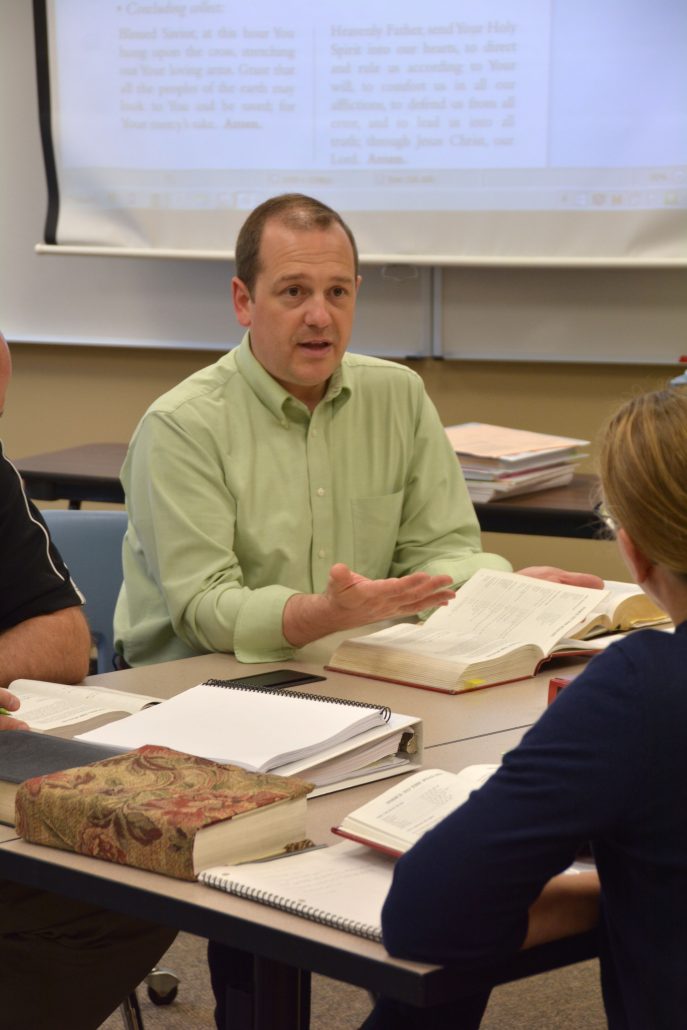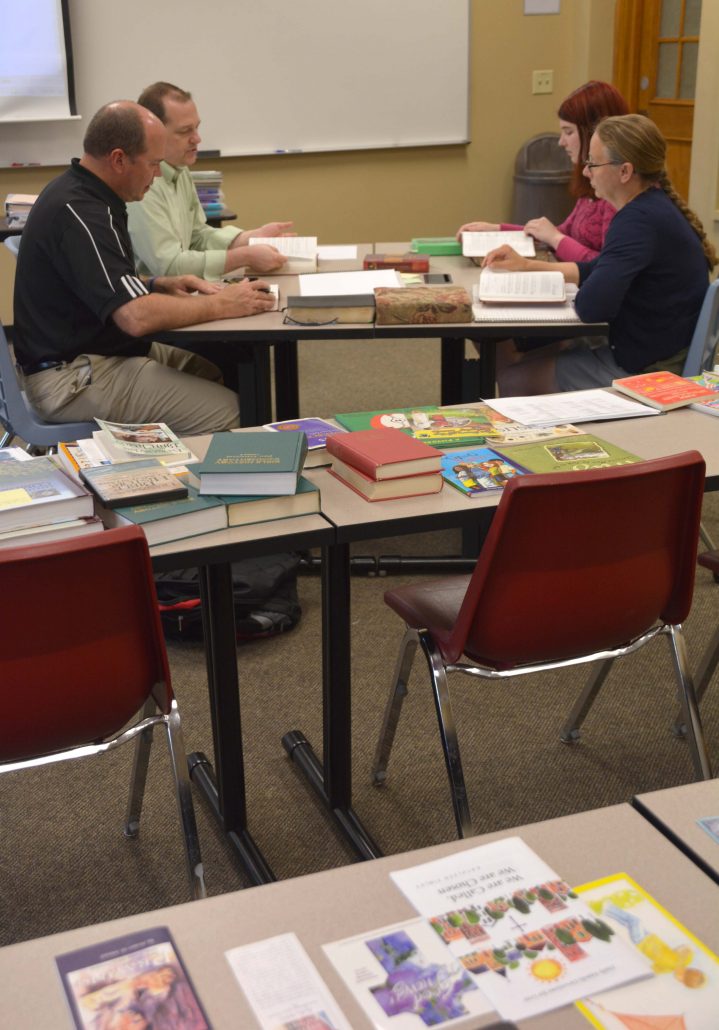It’s all about the books.
As a grade 1-8 teacher for 13 years and a college education professor for eight years, Professor Jon Roux DMLC ’95 has loved teaching and talking about books.
But books are just the start. Really, he loves language arts in general—that broad content area containing everything from reading comprehension to speaking and listening, from grammar to visual literacy.
Now, after more than two decades of experience, Professor Roux is excited to share his expertise and his love of language and literature with inservice teachers in the graduate course, Integrating the Language Arts.
“This course introduces and reviews best practices for language arts instruction,” he explains. “The course is framed around the following balanced language arts components: reading (including children’s literature), writing, listening, speaking, viewing, visual representation, spelling, and grammar.”
The course addresses challenges like these:
- Which language arts skills should I be teaching?
- What resources can I use to teach those skills?
- What approaches can I use other than reading from a language arts textbook?
- How can I incorporate language arts across the curriculum?
- How can I use mentor texts to teach writing?
- How can I teach listening and speaking—two important skills that are often under-taught?
- How can I teach viewing and visual representation?
- How can I teach spelling in more effective ways?
- How can I teach all the language arts in the light of God’s Word?
“It’s difficult to separate the components of language arts in my mind,” he says. “My favorite thing to do is reading to and with students. The excitement that comes from reading a well-written book is contagious.”
As an example, Professor Roux explained how he might conduct a book discussion with children.
“I feel that a successful book/story discussion begins with good modeling by the teacher,” he says. “As a teacher, my excitement about a book influences my students’ engagement. I begin my book discussions by showing the book I’m reading and trying to make a real-life connection.
“I just finished Jennifer Chambliss Bertman’s Book Scavenger. I’d show the book and talk about the picture on the front cover (a window in a San Francisco Victorian row-house, showing the silhouette of a book and a girl holding books and a magnifying glass). I’d then have a brief discussion about codes and ciphers I’ve used and show a coded message on the board for the students to figure out. Once we’d done that, I’d continue to share the premise of the book, read a few segments of cliff-hanging action, and then let the students get into the book.
“I like to get students to share the ‘what happened’ portion of what they’ve read and tell why they liked it,” he continues. “Students can also talk about characters and setting, but I’ve found that this comes through naturally as they talk about the action. As they talk I ask what they thought when they started the book and how they felt as they read through it. Was there a point that surprised them? Was there a part where they felt they were right there in the book too?
“Using a book is a great way to show students how to write,” he continues. “Books used in this fashion are often referred to as mentor texts. This does not require reading an entire book to students, but allows teachers to give book commercials and read excerpts from various books to teach and demonstrate writing qualities, parts of speech, and so on.”
Professor Roux is just finishing his doctorate in literacy at the University of Minnesota. He’s been sharing his love of literature and language arts with hundreds of MLC students, teaching pedagogy courses in language arts, reading, and children’s literature. And now he’s excited to expand the conversation to include inservice teachers.
“I’m looking forward to fostering relationships, supporting teachers, and growing through a shared body of knowledge and insights. I believe that educating individuals can happen and does happen at every age. There is no end to learning.”
Meet Professor Jonathan Roux
Family: He and Jill (née Gaertner) have two children: Kaitlyn and Micah, a high school senior and sophomore, respectively.
Hobbies: Reading, walking, working in the yard, small woodworking projects, traveling.
Favorite music: All types of music, but also National Public Radio and Minnesota Public Radio.
Favorite books: There are so many! My most recent reads include Pam Muñoz’s Echo, Chris Grabenstein’s Escape from Mr. Lemoncello’s Library, Jennifer Chambliss Bertman’s Book Scavenger, and Brian Selznick’s The Marvels.
Education: BS Ed: DMLC ’95 (majors in elementary ed, secondary ed, and parish music); MS Ed: McDaniel College ’05; PhD candidate: University of Minnesota.
Ministry: 1995-2008: Divine Peace-Largo, Maryland: principal, grade 1-8 teacher, organist, choir accompanist; 2008-present: Martin Luther College.
Professional memberships: Executive board member of Southwest Minnesota Reading Council; member of Association for Supervision and Curriculum Development, International Literacy Association, and Minnesota Reading Association.







